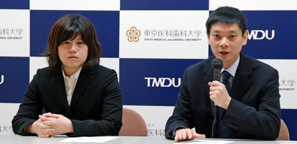“Dissecting molecular mechanisms of tumor progression”

Kiyotsugu Yoshida
Associate Professor,
Department of Molecular Genetics,
Medical Research Institute (right)
Naoe Taira
Research Fellow of the Japan Society for the Promotion of Science,
Department of Comprehensive Pathology,
Graduate School of Medical and Dental Sciences (left)
A research group led by Associate Prof. Kiyotsugu Yoshida at Department of Molecular Genetics, Medical Research Institute, Tokyo Medical and Dental University revealed that DYRK2 kinase is a key enzyme to control tumor progression. This work was supported by Grant-in-Aids for Scientific Research from the Japan Society for the Promotion of Science. The research results were published online on 6, Feb 2012 in The Journal of Clinical Investigation.
Point
| ● | New molecular mechanisms underlying modulation of tumor progression have been clarified. |
| ● | “DYRK2”, a kinase controlling tumor progression, has been identified. |
| ● | DYRK2 could be a promising target of therapeutic implication for advanced cancers. |
Content of the research
Dysregulation of the G1/S transition control in the cell cycle is one of the important mechanisms in the development of human tumors. The oncogenic transcription factors, c-Jun and c-Myc, are indispensable regulators for the cell cycle at the G1/S transition, which is initiated upon phosphorylation by GSK3β, and these aberrant expressions contribute to many malignancies. We revealed that DYRK2 functions as a priming kinase whose phosphorylation of c-Jun/c-Myc precedes and is required for subsequent GSK3β phosphorylation. We found that DYRK2 inactivation allowed c-Jun/c-Myc to escape from the ubiquitination-mediated degradation. As a result, aberrantly accumulated c-Jun/c-Myc accelerated cell proliferation and tumor progression. We also found marked attenuation of DYRK2 expression in multiple cancerous tissues. In particular, down-regulation of DYRK2 significantly correlated with unphosphorylated c-Jun/c-Myc, and the invasiveness of human breast cancers. Notably, in advanced breast cancers, DYRK2 expression was significantly diminished, suggesting that DYRK2 exerts tumor suppressive function. These results demonstrate that DYRK2 regulates tumor progression through modulation of c-Jun/c-Myc. Our results emphasize DYRK2 as a potential target of therapeutic implication for advanced cancers by restoring its expression and function.
Contact
Kiyotsugu Yoshida, M.D., Ph.D.
Department of Molecular Genetics, Medical Research Institute
Tokyo Medical and Dental University
1-5-45 Yushima, Bunkyo-ku, Tokyo, Japan 113-8510
Phone: +81-3-5803-5826
E-mail: yos.mgen(at)mri.tmd.ac.jp
*Please change (at) in e-mail addresses to @ on sending your e-mail to contact personnels.
Department of Molecular Genetics, Medical Research Institute
Tokyo Medical and Dental University
1-5-45 Yushima, Bunkyo-ku, Tokyo, Japan 113-8510
Phone: +81-3-5803-5826
E-mail: yos.mgen(at)mri.tmd.ac.jp
*Please change (at) in e-mail addresses to @ on sending your e-mail to contact personnels.

